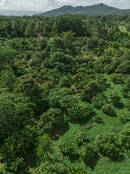Noticias

The Food and Agriculture Organization of the United Nations (FAO), in partnership with the Economic Community of West African States (ECOWAS), with the financial support of the Swedish International Development Cooperation Agency (Sida), held a training workshop in Freetown, Sierra Leone, from the 23rd to the 27th of October. The activity focused on the development of robust subregional capacities in national forest inventories (NFIs), an endeavor that carries profound implications for the future of West Africa's landscapes.
Hosted by FAO and the Forestry Department of the Ministry of Environment and Climate Change of Sierra Leone, the event gathered 20 participants from...

For decades, the global community has actively collected efforts to reduce deforestation. While there is a growing momentum on the crucial collaborations between agriculture and forestry sectors, financing into nature, especially in the contexts of forests, remains inadequate and underreported. To meet global climate, biodiversity, and land degradation targets, financing for forest pathways needs to at least triple, reaching over USD 200 billion annually by 2030.
It’s noteworthy that the majority of these investments are fueled by government expenditures. Forests, crucial for climate and agriculture livelihoods, require action supported by strategic investments and innovative finance sources. However, significant gaps exist in...
FAO and Japan launch new project to strengthen global agriculture for a forest positive future
06/10/2023
06/10/2023

During the 30th Session of the Asia-Pacific Forestry Commision held in Sidney (Australia), the Food and Agriculture Organization of the United Nations (FAO) and the Ministry of Agriculture, Forestry and Fisheries of Japan (MAFF) launched a new global project aimed at addressing the critical issue of deforestation, while also highlighting the transformative role that agriculture supply chains can play as a solution.
Over the course of three years, from October 2023 to September 2026, the "Building Global Capacity on Halting Deforestation and Conversions from Agricultural Commodities" (BiG-CHANCE) project sets out to harmonize the agricultural and forestry sectors to achieve climate, biodiversity, land...

Would you like to contribute to our survey on 'Needs Assessment and Engagement Survey - Assessing needs and opportunities for promoting forest positive agriculture and sustainable food systems'? Help us identify gaps and needs, and explain how the UNFSS Forests & Food Systems coalition (FFS) can support stakeholders from both public and private sectors in forestry, agriculture, and trade, in addressing the topic of forest positive agricultural value chains.

Capacity development activities in forest monitoring, including face-to-face workshops and online courses, can serve as important tools for increasing awareness on gender. However, women and other underrepresented groups, including youth, Indigenous peoples and people with disabilities, face significant barriers to accessing opportunities to participate in training and other capacity development initiatives, particularly in the forest sector. These barriers commonly include household burdens such as childcare, as well as social norms that undervalue the role of women in forestry.
While there are a number of strategies for improving women’s participation in these initiatives, it can be useful to canvas ideas directly from...

